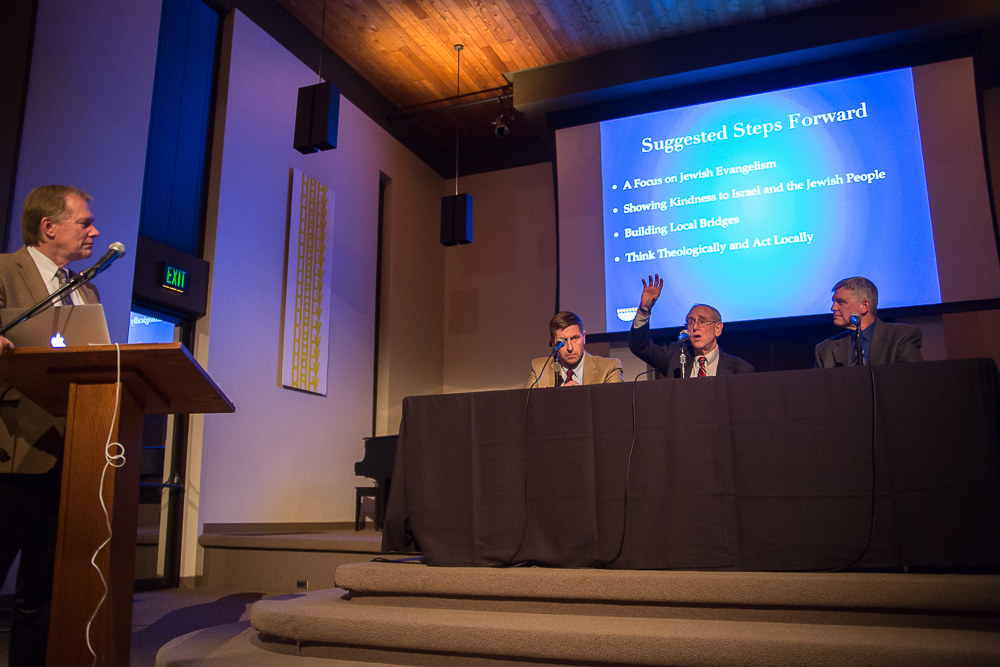Students gathered in Calvary Chapel on March 2 to hear a panel discussion hosted by Talbot about the relationship between the Jewish people and the Church, called “Israel & the Church: A Troubled Past and Glorious Future.” The event featured three speakers who discussed the theological, historical and practical consequences of interactions between Christian believers and the Jewish people.
The discussion panel included Mark Saucy, professor of theology, Michael Vlach, associate professor of theology at The Master’s Seminary and Mitch Glaser, President of Chosen People Ministries. Each speaker gave a lecture about their respective perspectives before hosting a collaborative question and answer session.
THE CENTRAL FOCUS
Saucy’s lecture, titled “The Future of Israel According to Scripture,” focused on the theological and hermeneutical perspective of Israel in the Bible. He suggested that a further emphasis on the relevance of Israel was needed in current Christian theology.
According to Saucy, although Israel’s story is a central focus in the Bible, it is often underrepresented in the traditional Christian narrative. He sought to re-define the “Christian story” by following the biblical fulfillment of God’s covenant to his people, rather than the traditional Christian view, which focuses mostly on the redemption brought by Christ.
“The question about Israel’s future is a question about God’s land,” Saucy said. “It’s a question of electing faithfulness of the covenant-keeping God.”
HISTORY AND EXPLANATION
Vlach presented the next lecture, titled “The Influence of the Church Fathers on Evangelical Views of Israel Today.” He provided a history and explanation of the Church’s view of Israel, addressing the replacement and restoration theological paradigms. Vlach explored the cultural movements that popularized both theologies, tracing the events in Christian history that reflected the corresponding views.
Essentially, the replacement theology suggests the idea that the Church as a whole has replaced Israel in God’s promise, effectively becoming a spiritual Israel. Although it has been commonly held in historical and modern Christianity, Vlach felt that the replacement approach was problematic. He suggested that it over-spiritualized the concept of the Kingdom of God, ignoring God’s covenant to the Jewish people. He then described the restoration theology as the belief that, despite the temporary hardening of Israel towards the Gospel, Israel as a holy nation will ultimately be saved. In his opinion, this view was more biblically founded, as it is based on a more literal and continuous interpretation of the Bible. Though initially overturned in church history, restoration theology was experiencing a modern revisitation, considering events such as the reestablishment of Israel as a nation.
PERSONAL INSIGHT
Glaser delivered the last lecture, called “Israel & the Church: A Troubled Past & Glorious Future.” As a Messianic Jew, he provided personal insight into the perspective of Jewish people, describing the cultural disparity and the historically-based aversion that modern-day Jews held towards the Church. He emphasized that in order to accept Christ, Jews needed to separate the idea of believing in Jesus from the idea of joining the Church as an institution.
Glaser also provided a practical consideration of how Christians should approach Jewish people in the present, encouraging believers to act kindly in small, local ways towards Jewish people in their community.
“Frankly, the only way a Jewish person is going to perceive a difference is through the way you behave towards them,” Glaser said. “When a Jewish person is confronted with the genuine love of a born-again believer, they will have a difficult time believing that Christians hate Jews.”
IN THE NOW
While this panel event thoroughly covered many factors of Jewish-Christian interactions, it provided even more opportunities for Christians to personally consider what they believe. The Q&A session, for example, brought up additional issues regarding church treatment towards Jews and interpretations of Revelation.
One briefly covered topic was the possible way to reconcile the replacement and restoration theological views. Although the discussion is large and multifaceted, it is clear that it is significant to consider, especially for Biola students.
“I think this discussion is really important because it influences how we act in the now, if our theology should impact the way we live,” said Micah Hogan, freshman English and biblical studies major. “And both sides of the question have practical ramifications… It really deserves a lot of thought.”







